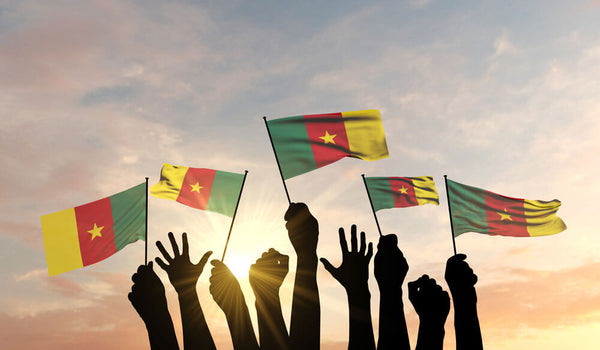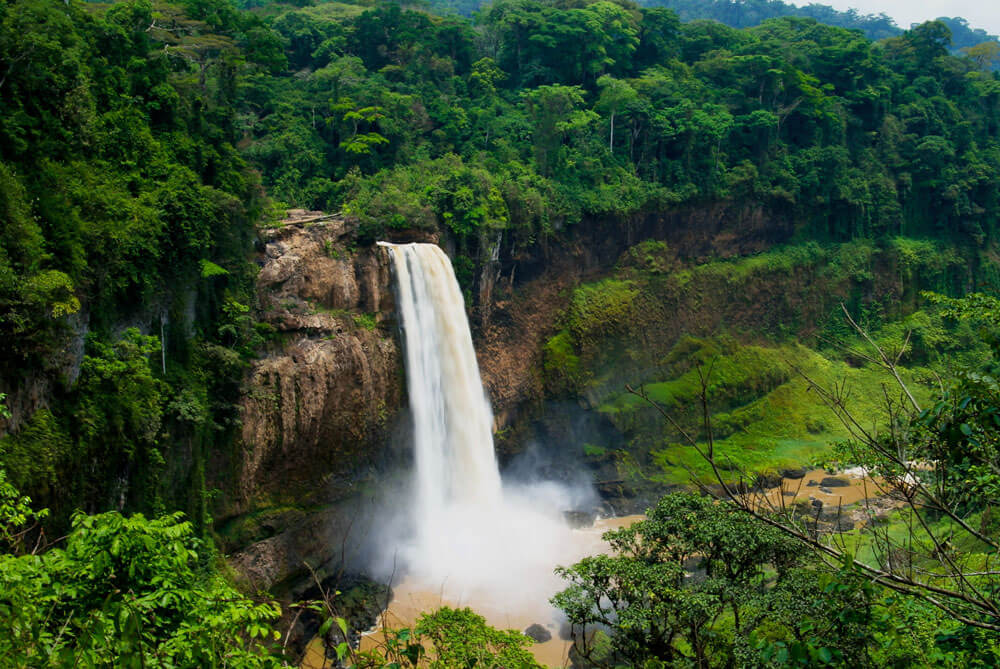Located in Africa, Cameroon is a captivating country that offers a wealth of experiences. From its breathtaking landscapes and warm-hearted locals to its vibrant culture and storied history, Cameroon has something to enthrall every visitor. Embark on a journey with me as we delve into the geographical wonders, cultural tapestry, native languages, diverse wildlife, historical significance, artistic expressions, mouthwatering cuisine, lively festivals, and mesmerizing attractions that make Cameroon a truly remarkable destination.

Cameroon is located in the West-Central region, bordering Nigeria, Chad, Central African Republic, Equatorial Guinea, Congo, and Gabon. It is also a part of the French-speaking community and is a member of the African Union. Cameroon has a population of over 22 million people and is known for its vast natural resources, such as gold and oil.
The country is diverse and beautiful, with landscapes ranging from lush rainforests and rugged mountains, to dry savannas and sandy beaches. The region is teeming with a diverse range of wildlife, from majestic gorillas and elephants to awe-inspiring lions.
Geography
Cameroon is a nation of rich diversity, boasting a range of physical features. It is geographically divided into ten semi-autonomous regions: North, South, Adamawa, East, West, Centre, Extreme North, Northwest, Southwest, and Littoral. The Northwest and Southwest regions were formerly part of British Cameroon, while the other regions belonged to French Cameroon.

The northern region is characterized by rugged mountains, while the southern region is made up of flat plains.
The country is also home to a number of rivers, including the Congo, Sanaga, Benue, and Logone rivers. In addition, the country also has several large lakes, such as Lake Chad, the twin lakes of Muanenguba, and Lake Nyos.
The climate is tropical, with temperatures ranging from hot to cold. The country experiences a wet season from May to October, and a dry season from November to April.
Let's Explore the Vibrant Culture of Cameroon
Cameroonian society is a vibrant fusion of diverse tribal groups, each with its unique traditions, dance, music, and food. The country is often referred to as 'Africa in miniature' due to the multitude of its cultural richness.

In the northern regions, one can witness the spectacular 'Pouss-Pouss' dance, a testament to the local folklore. Meanwhile, in the coastal areas, the 'Bikutsi' music genre rules supreme, echoing the rhythms of the indigenous people. The cuisine is equally diverse, with dishes like 'Ndole' and 'Fufu', offering a culinary journey through the nation's rich heritage.

The History Behind the Cameroon Flag
The Cameroonian flag is steeped in rich symbolism and profound historical significance. Unveiled on May 20, 1975, it proudly carries the vibrant Pan-African colors, with each stripe bearing its own unique representation. The lush green stripe represents the dense and magnificent southern forests, serving as a poignant testament to the country's abundant natural resources and biodiversity. The striking red middle stripe stands as a powerful symbol of unity, beautifully embodying the shared blood and collective spirit of Cameroon's diverse citizens. It serves as a constant reminder of the strength that lies in togetherness. The captivating yellow stripe reflects the vast savannas of the northern regions, basking in the warm glow of the sun, which is not only a source of life but also a symbol of hope, optimism, and happiness for the people of Cameroon. At the very heart of the flag, a resplendent five-pointed yellow star shines brightly, representing the unwavering unity and harmony of the country's diverse regions under one nation. This magnificent flag serves as a true beacon, proudly waving in the wind, encapsulating Cameroon's rich past, vibrant present, and promising future.
The Language & People
Cameroon is also home to a variety of languages, with French and English being the two official languages. Other dialects spoken include Fulfulde, Ewondo, and Bassa. Within Africa,Cameroon is one of the top five countries from which we find our DNA test results. Some of the ethnic groups that the African Diaspora shares ancestry with include the Tikar, Bamileke and Ewondo.

Cameroonians are incredibly diverse, with a mix of ethnicities, and religions. Muslims, Christians, and followers of traditional religions all make up a significant portion of the population.
The people are also are known for their hospitality and friendliness. The country is also known for a variety of traditional festivals, dances, and ceremonies.
Wildlife & Nature
Cameroon is home to a wide range of wildlife, including gorillas, elephants, lions, leopards, antelopes, and chimpanzees. The country is also home to a variety of birds, such as the bald ibis, the African fish eagle, and the Great Blue Turaco.
In addition, the country is home to a number of national parks and reserves, such as the Chimpanzee Sanctuary and Wildlife Center, the Dja Faunal Reserve, and the Lobéké National Park. These parks and reserves are home to a variety of wildlife and plants, and offer a great opportunity to explore and learn about Cameroon's unique wildlife and nature.
History & Politics
Cameroon has a rich and complex history, going back to pre-colonial times. The country was colonized by the British and French in the late 19th century, and was then administered by the United Nations in the 1960s. After gaining independence in 1960, the country experienced a period of political turmoil, eventually leading to the formation of a multi-party government in the 1990s.
Today, the country is a democratic nation, with a president who is elected every seven years. The country also has a bicameral parliament, with an upper house (the Senate) and a lower house (the National Assembly).
Music & Art

Cameroon is a land of music and art, with a vibrant music scene and a rich tradition of art. Traditional music is often accompanied by drums and other instruments and is often used to tell stories.

Traditional art is used to depict the country's history, culture, and customs.
Cameroon is also home to a variety of modern music, such as Makossa, Bikutsi, and Benga, as well as a variety of traditional music genres, such as Balafon, Calabash, and Njang.
The country is also home to a number of museums and galleries, which showcase a variety of traditional and contemporary artworks.

Cuisine
Cameroonian cuisine is a mix of African, French, and Mediterranean flavors. The country is known for its delicious and spicy dishes, such as ndole (a stew made with bitterleaf and peanuts), mbanga soup (made with fish and spices), and koki (a cassava-based dish).
Cameroon is also known for its delicious street food, such as koki (a fried dough ball), plantain fritters, and yam patties. These dishes are often served with spicy sauces, such as pili-pili (a hot pepper sauce) and ndole (a peanut-based sauce).
Cameroon's Festivals & Celebrations
Cameroon is home to a variety of festivals and celebrations, which take place throughout the year. These include the Bamenda International Festival of Music, the Douala International Festival of Arts, and the Mfoundi International Festival of Arts. Other festivals include the Grand Batanga Festival, the Grand Bafut Festival, and the Grand Mfoundi Festival. These festivals are renowned for their vibrant music, dance, and art performances.
The country also celebrates a number of religious festivals, such as Easter, Ramadan, and Christmas. These religious festivals are celebrated with feasts, processions, and traditional dances.
Cameroon's Tourism & Attractions
Cameroon is a captivating tourist hotspot, offering a plethora of attractions and activities for visitors to relish. The country boasts an array of awe-inspiring national parks and reserves, including the Chimpanzee Sanctuary and Limbe Wildlife Centre, the esteemed Dja Faunal Reserve, and the magnificent Lobéké National Park.

These parks and reserves are home to a variety of wildlife and plants, and offer a great opportunity to explore and learn about Cameroon's unique wildlife and nature.
The country is also home to a number of historical sites, such as the slave port of Kribi, the Akwa palace in Douala, the Waza National Park, and the Mungo National Park. These sites offer a glimpse into the country's history and culture.
There are also a number of beautiful beaches to visit, such as Limbe Beach and Kribi Beach. These beaches are a great spot for swimming, sunbathing, and enjoying the stunning views of the Atlantic Ocean.
Conclusion
From the lush rainforests of the Dja Faunal Reserve to the beautiful beaches of Limbe and Kribi, Cameroon has something to offer for everyone. With its diverse wildlife, historical sites, and stunning scenery, this African nation is sure to provide a unique and memorable experience. Whether you’re looking for a leisurely beach vacation, an exciting wildlife adventure, or an educational journey through history and culture, Cameroon is the perfect destination. So come explore this captivating nation and discover all its hidden treasures with African Ancestry Family Reunions® .




